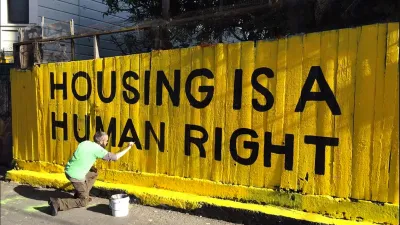Aaron M. Renn has written a scathing review of the state of affairs in Rhode Island, which he describes as a result of decades of unfettered "blue state" policies.
Aaron M. Renn's latest for the City Journal is a wide-ranging editorial, but Renn cites a number of examples from the planning and development realm too build his case regarding the mismanagement of Rhode Island. For example:
- Building has gotten harder. According to Bob Baldwin, a home builder: "They’ve changed the zoning to increase minimum lot sizes, even in areas where nothing is currently built to that size…Plus, there are regulations that go well beyond the state minimums and vary from town to town."
- "The biggest problem for developers is that the approval process can drag out through endless cycles of reviews and objections," explains Renn. Baldwin is again cited, saying that local builders are budgeting for lawsuits during the approval process, and after approvals require several years, developers often wait again for building permits.
- All that process regulatory difficulty has contributed to the cost of living, says Renn: "the so-called median multiple—what a median-income family would have to spend to buy a median-priced home—is 4.4 times income. Accounting for high costs, one survey ranked the average wage, adjusted for cost of living in metro Providence (which includes the entire state), 48th out of 49 large regions for which data were available. (Other surveys show the state doing somewhat better.)"
- The state is also facing increased costs for long-overdue repairs to critical infrastructure, according to Renn. "Rhode Island ranks fourth-worst in the nation in the percentage of its bridges considered structurally deficient. One major crossing, the Sakonnet River Bridge, recently had to be replaced at a cost of $163 million because of deterioration resulting from a lack of routine maintenance. The condition of roads and highways isn’t much better…Rhode Island ranks 49th among states in per-capita highway spending."
FULL STORY: The Bluest State

Alabama: Trump Terminates Settlements for Black Communities Harmed By Raw Sewage
Trump deemed the landmark civil rights agreement “illegal DEI and environmental justice policy.”

Study: Maui’s Plan to Convert Vacation Rentals to Long-Term Housing Could Cause Nearly $1 Billion Economic Loss
The plan would reduce visitor accommodation by 25% resulting in 1,900 jobs lost.

Why Should We Subsidize Public Transportation?
Many public transit agencies face financial stress due to rising costs, declining fare revenue, and declining subsidies. Transit advocates must provide a strong business case for increasing public transit funding.

Wind Energy on the Rise Despite Federal Policy Reversal
The Trump administration is revoking federal support for renewable energy, but demand for new projects continues unabated.

Passengers Flock to Caltrain After Electrification
The new electric trains are running faster and more reliably, leading to strong ridership growth on the Bay Area rail system.

Texas Churches Rally Behind ‘Yes in God’s Back Yard’ Legislation
Religious leaders want the state to reduce zoning regulations to streamline leasing church-owned land to housing developers.
Urban Design for Planners 1: Software Tools
This six-course series explores essential urban design concepts using open source software and equips planners with the tools they need to participate fully in the urban design process.
Planning for Universal Design
Learn the tools for implementing Universal Design in planning regulations.
Caltrans
Smith Gee Studio
Institute for Housing and Urban Development Studies (IHS)
City of Grandview
Harvard GSD Executive Education
Toledo-Lucas County Plan Commissions
Salt Lake City
NYU Wagner Graduate School of Public Service





























